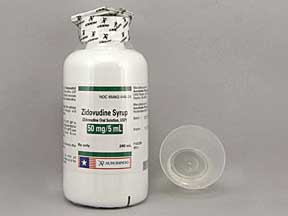
Zidovudine Coupons & Savings Card – Discount Prices from $21.68
Generic for: Retrovir
My prescription
Edit
240ML of 50MG/5ML, Zidovudine (1 Bottle)
Select pharmacy

CVS
$42.46
COUPON PRICE
Walgreens
$21.68
COUPON PRICE
Albertsons
$23.60
COUPON PRICE
Walmart
$54.28
COUPON PRICEZidovudine savings card
Show this card to your pharmacist
Walgreens
$21.68
BIN
ID
PCN
GRP
015995
LHKPV549065
GDC
DR33
Powered by
Related HIV NRTIs prescriptions
More prescriptions for hiv treatment
Related HIV NRTIs prescriptions
More prescriptions for hiv treatment
Price history for Retrovir (brand) & Zidovudine (generic)
1 Bottle, 240ML of 50MG/5ML
Average retail price for Retrovir
Average retail price for Zidovudine
Average SaveHealth price for Zidovudine
Our price history data is based on aggregated prescription data collected from participating pharmacies in America. Our prescription data updates daily to reflect the latest price changes. If you notice a missing data point, it means there wasn't sufficient data available to generate a monetary value for that date.
We analyzed Zidovudine prices for (240ML of 50MG/5ML, 1 Bottle) over the last 12 months. The average retail price was $156.86, while the average price using the SaveHealth discount card was $49.78. That's a savings of approximately 68.26% when using our Zidovudine coupon.
Compared to the generic version, Retrovir had an average price of $98.02 over the same time period. With the SaveHealth savings card, Zidovudine is 49.21% cheaper on average than Retrovir.
*Retail prices are based on pharmacy claims data, and may not be accurate when we don't have enough claims.
Zidovudine dosage forms
Dosage Quantity Price from Per unit 240ML of 50MG/5ML 1 Bottle $43.56 $43.56 240ML of 50MG/5ML 2 Bottles $78.12 $39.06 240ML of 50MG/5ML 3 Bottles $112.68 $37.56
| Dosage | Quantity | Price from | Per unit |
|---|---|---|---|
| 240ML of 50MG/5ML | 1 Bottle | $43.56 | $43.56 |
| 240ML of 50MG/5ML | 2 Bottles | $78.12 | $39.06 |
| 240ML of 50MG/5ML | 3 Bottles | $112.68 | $37.56 |
